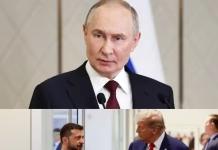Russia’s President Vladimir Putin has revoked his country’s ratification of the Comprehensive Nuclear Test Ban Treaty (CTBT), a move he says is designed to bring Moscow in line with the United States.
The new law to abandon the landmark agreement outlawing nuclear weapons tests was signed on Thursday, a week after Russia’s upper house Federation Council unanimously approved it.
The lower house State Duma had already passed the bill in an accelerated vote. With Putin’s signature, the legislation came into effect on Thursday.
The 1996 treaty outlaws all nuclear explosions, including live tests of nuclear weapons, though it was never effective because some key countries did not ratify it.
Moscow on October 6 announced its intention to withdraw from the treaty to “mirror” the position of the US, which has signed, but not ratified the treaty.
US Secretary of State Antony Blinken said that Russia’s move “represents a significant step in the wrong direction, taking us further from, not closer to, entry into force. Russia’s action will only serve to set back confidence in the international arms control regime.”
“Russian officials say Russia’s planned move to withdraw its ratification does not mean that it will resume testing, and we urge Moscow to hold to those statements,” Blinken said.
In addition to the US, the CTBT has yet to be ratified by China, India, Pakistan, North Korea, Israel, Iran and Egypt.
Robert Floyd, the head of the Comprehensive Nuclear-Test-Ban-Treaty Organization, whose job is to promote recognition of the treaty and build up its verification regime to ensure no nuclear tests go undetected, condemned Russia’s step.
“Today’s decision by the Russian Federation to revoke its ratification of the Comprehensive Nuclear-Test-Ban Treaty is very disappointing and deeply regrettable,” Floyd, who had tried to lobby senior Russian officials to change their minds, wrote on X, formerly known as Twitter.
France, one of the treaty’s original signatories, said it “deplored” Russia’s decision to revoke the ratification.
“Russia’s decision compromises the work of making the treaty universal. We reaffirm the importance of the CTBT and its full implementation,” it said.
Uncertainty
It is unclear whether the revocation will result in Russia resuming tests of nuclear weapons.
Putin said on October 5, “I hear calls to start testing nuclear weapons. I am not ready to say whether we really need to conduct tests or not.”
Deputy Foreign Minister Sergei Ryabkov said earlier this month that Moscow would continue to respect the ban and would resume nuclear tests only if the US does so.
“As our president said, we must be on alert, and if the United States moves towards the start of nuclear tests, we will have to respond here in the same way,” the official said.
Just hours after the upper house vote, Russia’s military conducted a “massive” retaliatory nuclear strike drill.
The exercise, which involved the test launch of missiles from a land-based silo, a nuclear submarine and a long-range bomber aircraft, was overseen by Putin.
The US has said previously that it was “disturbed” by Russia’s move to revoke the CTBT ratification.
“A move like this by any state party needlessly endangers the global norm against nuclear explosive testing,” the US Department of State said.
Russia should not be “wielding arms control and irresponsible nuclear rhetoric in a failing attempt to coerce other states”, the State Department added, appearing to suggest that the move was aimed at pressuring the US and other countries which are supporting Ukraine in its fight against Russian forces.
Since invading its neighbour, Putin has repeatedly invoked Russia’s nuclear doctrine.
With the abandonment of the CTBT, the last remaining bilateral nuclear weapons treaty between Washington and Moscow is New START, under which the two nations used to regularly inspect each other’s nuclear facilities and limit warheads.
Russia suspended the treaty in February. It is due to expire in early 2026.
Ryabkov said last week that the Kremlin had received informal proposals from the US to resume talks on issues of strategic stability and arms control “in isolation from everything that is happening”.
However, he said Moscow believes it is “simply impossible” to return to such dialogue without a change in the “deeply fundamental hostile course towards Russia on the part of the US”.












